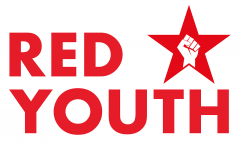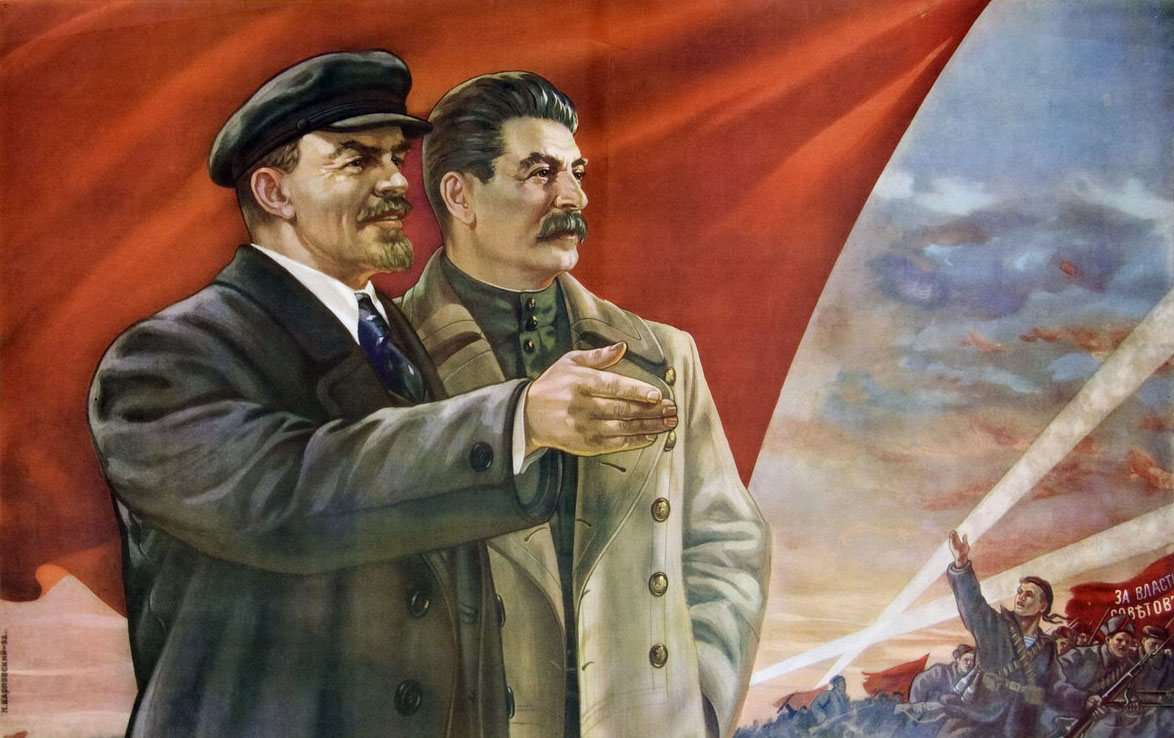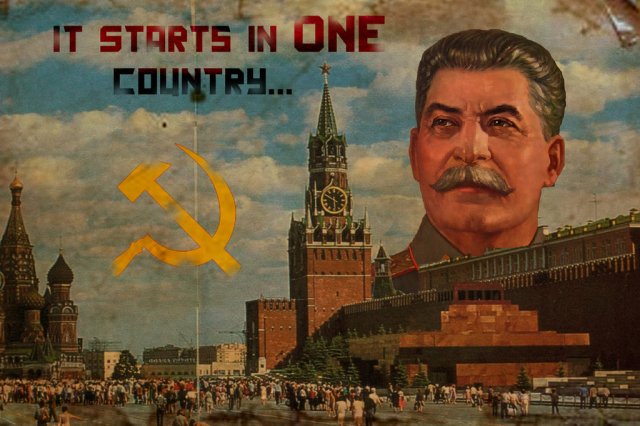Comrades from Red Youth gave a presentation to the Stalin Society on Sunday, discussing what the vital lessons of the Russian revolution, Stalin’s role in building socialism, and what it means to us today.
The presentation from comrade Dan is reproduced below.
Why bother discussing Stalin and the Soviet Union today? The case is closed, every news article adds a mandatory ‘dictator’ or ‘totalitarian’ as a prefix.
More terrifying than imperialist world wars, British concentration camps in South Africa, engineered famine in Bengal, the invasion, subordination, and plundering of over a quarter of the world.
More horrific than imperialist adventures in Iraq, former Yugoslavia, Afghanistan, Pakistan, in Iraq again, in Libya, Syria, and still in Gaza, still in the West Bank, still in Palestine.
And those are just the headlines within my lifetime, imperialism fighting the consequences of imperialism for the benefit of imperialism.
When the oppressed of the world throw off the shackles of imperialism taking back their land, their resources, their industries, built with their toil and their lives, as they follow in the footsteps of Lenin, Stalin, and the Soviet Union to destroy the old order, based on the oppression of the working class majority by an ever-decreasing minority of capitalists and build a new society of mutual co-operation for the advancement of humankind, this is not a noble or just cause in the eyes of the bourgeoisie.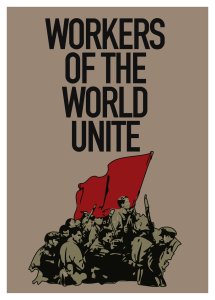
However, it is a moral and practical imperative for the global proletariat.
We have faced almost a century of all-out ideological war from the bourgeois camp and their petty-bourgeois agents. they are determined to neuter the revolutionary potential of the working-class, to erase the achievements of the people struggling and working for the benefit of the majority, and to obfuscate the path to socialism.
To quote Mao:
“Congratulating Stalin is not a formality. Congratulating Stalin means supporting him and his cause, supporting the victory of socialism, and the way forward for mankind which he points out, it means supporting a dear friend. For the great majority of mankind today are suffering, and mankind can free itself from suffering only by the road pointed out by Stalin.”
The struggle before the revolution
Stalin, the son of a cobbler, spent his youth in Georgia. He was expelled from the seminary at Tbilisi after studying Marxism and setting up underground Marxist groups. Undeterred, he continued learning and organising among the workers, writing leaflets and arranging strikes.
Despite the danger and discomfort of a revolutionary life, Stalin dedicated himself to this political work, in a time when it was illegal and the workers disunited. He organised a secret printing press, wrote leaflets, led strikes, and marched at the head of workers’ political demonstrations.
In 1901 he characterised the movement as such:
“The struggle began to reduce the working day, abolish fines, raise wages, etc. [The party] knew well that the development of the working-class movement was not confined to these petty demands, that the aim of the movement was not these demands, that they were but a means to the end.
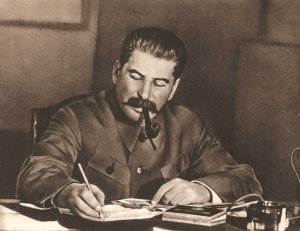 “These demands may be petty, the workers themselves in various towns and districts may be fighting and disunited today: this struggle itself will teach the workers that final victory will be achieved only when the entire working class goes forward to storm its enemy as a single, strong, organised force.
“These demands may be petty, the workers themselves in various towns and districts may be fighting and disunited today: this struggle itself will teach the workers that final victory will be achieved only when the entire working class goes forward to storm its enemy as a single, strong, organised force.
“The same struggle will show the workers that, in addition to their direct enemy the capitalist, they have another, still more vigilant, enemy – the organised strength of the entire bourgeois class, the present capitalist State with its troops, courts, police, prisons, [and] gendarmes.”
His life before 1917 was, despite spending the majority of it in prison, exile, or working underground, a revolutionary tour de force, fighting opportunism & reformism and producing both incisive analyses on the present situation and important contributions to Marxist-Leninist theory such as The National Question and Anarchism or Socialism.
 When it came to exposing the treachery of the petty-bourgeoise provisional government, the preceding struggle against the counter-revolutionary elements spearheaded by Lenin and Stalin was vital experience. Consistently taking the correct line, and being proven right time and time again by unfolding events, the masses rallied around the party to overthrow the treacherous provisional government.
When it came to exposing the treachery of the petty-bourgeoise provisional government, the preceding struggle against the counter-revolutionary elements spearheaded by Lenin and Stalin was vital experience. Consistently taking the correct line, and being proven right time and time again by unfolding events, the masses rallied around the party to overthrow the treacherous provisional government.
In October he was leader of the “Party Centre,” appointed to organise the workers’, sailors’ and soldiers’ insurrection of November 6-7 (old style calendar), which overthrew the power of capitalism in Russia and transferred power to the Councils of Workers’ and Soldiers’ Deputies, better known Soviets.
It was also this intense maelstrom of revolutionary conditions and activity that sharpened him for the tasks required after the October Revolution.
Stalin’s role in building socialism after the revolution
While it is entirely correct to describe Stalin as a firm and loyal adherent to Marxism-Leninism, who dedicated his life to the cause of the working class, it would be a mistake to assume this means he was inflexible and unchanging. In his own words, “There is dogmatic Marxism and creative Marxism. I stand by the latter.”
After Lenin’s death Stalin was a bulwark against counter-revolutionary elements in the party, for example Trotsky’s attempt to undermine the worker-peasant alliance, and the opportunistic, counter-revolutionary right opposition bloc throughout the 1920s to mention only a couple.
The Soviet Union endured many hardships, from the devastation of the civil war and the intervention from the majority of imperialist countries in this period. Careful negotiation was required to not just hold the country together, but to rebuild and quickly develop into a society that could withstand the counter-revolutionary onslaught from both within and without.
During Stalin’s leadership the peoples of the USSR proved themselves to be capable of this beyond all expectation. The plans to industrialise the country, increase agricultural production through mechanisation and collectivisation, the development of heavy industry were all completed far ahead of schedule. This was not spontaneous, but a carefully considered and managed drive towards building a new, socialist society, with many challenges to overcome. The masses of workers and peasants rallied to the party.
These were not the only developments, for there was a massive push, and a wildly successful push, in education, healthcare, and cultural and social aspects of life. The Soviet workers were building their own state, a state that would serve the people fully.
Stalin is often called a dictator, I think this is in part due to bourgeois propaganda, and in part due to a misunderstanding of the phrase “dictatorship of the proletariat.” As Marxists we understand that every kind of society is the dominance of one class over another, of slave-owners over slaves, of feudal nobility over serfs, and of capitalists over the working class. The dictatorship of the proletariat is simply a state where the most advanced class, that of the working class who conceive, construct, produce, and maintain everything are in charge.
So, under this “dictatorship” was there democracy in the USSR?
Well, party membership grew rapidly in the inter-war period, eventually having over 1500 delegates representing over a million party members. What party in our country today can boast of a membership like that?
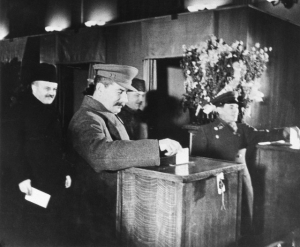 In the 1937 elections, the first after adopting the new constitution, 91 million people participated (96.8% of the population). Under the Soviet system the whole adult population was enfranchised, with workers directly voting for their own representatives, and any elected representative was faced with immediate recall if the workers felt they were not adequately serving them.
In the 1937 elections, the first after adopting the new constitution, 91 million people participated (96.8% of the population). Under the Soviet system the whole adult population was enfranchised, with workers directly voting for their own representatives, and any elected representative was faced with immediate recall if the workers felt they were not adequately serving them.
On the introduction of the new Soviet constitution in 1936 Stalin remarked:
“Bourgeois constitutions tacitly proceed from the premise that society consists of antagonistic classes, of classes which own wealth and classes which do not own wealth; that no matter what party comes into power, the guidance of society by the State (the dictatorship) must be in the hands of the bourgeoisie; that a constitution is needed for the purpose of consolidating a social order desired by and beneficial to the propertied classes.
“Unlike bourgeois constitutions, the draft of the new constitution of the USSR proceeds from the fact that there are no longer any antagonistic classes in society; that society consists of two friendly classes, of workers and peasants; that it is these classes, the labouring classes, that are in power; that the guidance of society by the State (the dictatorship) is in the hands of the working class, the most advanced class in society, that a constitution is needed for the purpose of consolidating a social order desired by and beneficial to the working people.”
It is ridiculous to portray Stalin as exercising unlimited authority and control over the party, the state, or the people. One simply has to look at the fierce political battles waged in the party and the engaged debates amongst worker’s councils.
It is equally ridiculous to refer to Stalin as Lenin’s “heir”, in that Stalin did not inherit the position of General Secretary, but was elected to it for his superb leadership and political capability, which proved crucial to the development of the USSR socially and economically, and during the second world war against fascism.
Trotsky himself, touted as “Lenin’s heir” by bourgeois agents, wrote in a response to a book by Max Eastman called Since Lenin Died in 1925:
“Comrade Lenin has not left any “Testament”; the character of his relations to the party, and the character of the party itself, preclude the possibility of such a “Testament.” The bourgeois and Menshevik press generally understand under the designation of “Testament” one of Comrade Lenin’s letters in which he gives the party some organizational advice. The Thirteenth Party Congress devoted the greatest attention to this and to the other letters, and drew the appropriate conclusions. All talk with regard to a concealed or mutilated “Testament” is nothing but a despicable lie, directed against the real will of Comrade Lenin and against the interests of the party created by him.”
Even Trotsky does not stand by Trotskyite arguments! Stalin had in fact offered to resign as General Secretary following the resurgence of Lenin’s so-called “testament”, but this was thankfully rejected by the party.
It is to be expected that people will generally accept the narrative of bourgeois propaganda as there is often little alternative. What is remarkable, or perhaps just very telling, is that elements of the left will swallow and regurgitate these exaggerations, distortions, and lies wholesale.
It is often the case that these people will champion the ideas of debate, of scientific theory, of reason and logic and criticism, and yet would never question or investigate what is passed off as fact when it concerns the Soviet Union. Wittingly or unwittingly they become a champion of anti-communist propaganda.
But still, why talk about Stalin today?
I’ve heard many arguments to dismiss Stalin, the Soviet Union, and even communist language and ideology from building a working-class movement in Britain today.
“Who wants a captain who lulls the vigilance of [their] army, a captain who does not understand that the enemy will not surrender, that [they] must be crushed? To be such a captain means deceiving, betraying the working class.”
A quote from Stalin that I feel is particularly relevant today. The struggles of the Russian communists, from their early days, through intense reaction and suppression, a world war, and finally into developing a worker’s state have invaluable lessons for us.
Every comrade in our study classes on the history of the Russian revolution remarks on the parallels between then and now. The treachery of social democracy, the misleading paths of opportunism, reformism, and revisionism.
By all means, be critical of the Soviet Union and of Stalin, but do it on a factual basis, and on a Marxist basis, rather than starting from the bourgeois propaganda and justifying yourself from there.
“Education is a weapon whose effects depend on who holds it in their hands and at whom it is aimed.”
Another quote from Stalin. Personally, I cannot represent a party that does not tell the truth, that does not adopt the position that will eventually emancipate the working classes. Who will trust a party that tells them to vote Labour today to solve all their problems, when tomorrow this is proved to be a fraud?
We can and we must learn from the Soviet Union, from Lenin, and from Stalin, and honestly learn from their successes and their failures. Only by embracing our working-class history, and our communist history, can we build the movement in the present, and for the future.
As the American communist William Z. Foster said:
“Stalin has further developed Marxism-Leninism through many invaluable theoretical accomplishments. His principal contributions to Marxist theory lie in indicating the path of the actual building of socialism in the U.S.S.R. Thus, his powerful polemics against Trotsky, Zinoviev, Bukharin and their counter-revolutionary affiliates comprised the greatest ideological struggle of our times. They clarified every aspect of the vast and unique problem of building socialism in one country, and surveyed the whole position of international capitalism. They resulted in a decisive victory for the leadership of the Communist Party and, thereby, of socialism.”
One last quote from the man himself:
“Real liberty can exist only where exploitation has been abolished, where there is no oppression of some by others, where there is no unemployment and poverty, where a [person] is not haunted by the fear of being tomorrow deprived of work, of home, and of [food]. Only in such a society is real personal and every other liberty possible.”
Such liberty is possible, but only if we do not blind ourselves to the path to reach it.
